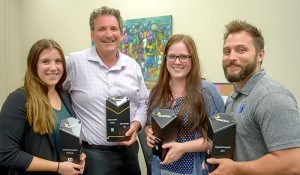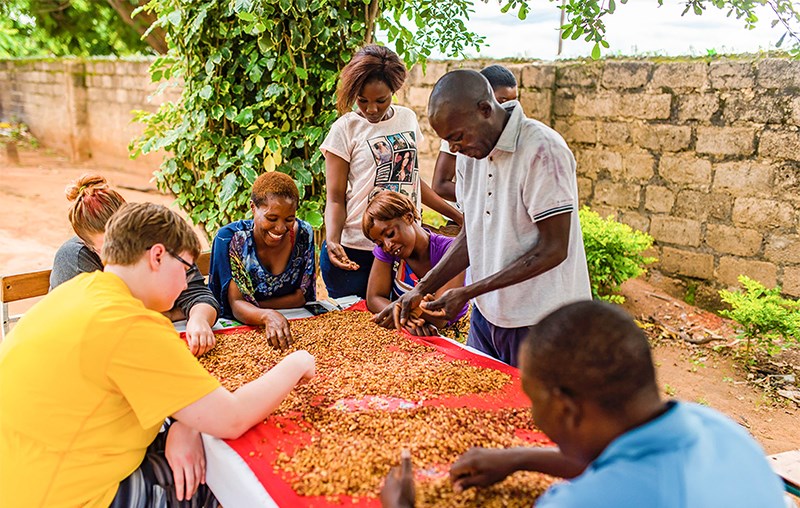Cathy Dobson
In rural Zambia where farmers struggle to provide for their families, a team from Lambton College is spearheading a new venture to make peanut butter.
That’s right. Hippy Peanut Butter comes in jars sporting a smiling purple hippopotamus, and it’s making a difference after just four months.
“The climate is good to grow peanuts,” explains 21-year-old Megan Rizzo, one of nine students with the award-winning team, which has taught Zambian farmers how to sort their peanut crop, shell the nuts, roast and skin them, then mash them up into peanut butter.

The team’s manufacturing centre is extremely modest by North American standards, with only one mashing machine producing about 250 jars of peanut butter a week.
But it’s successful and provides income for about 50 farmers despite having been in operation only since February.
A major Zambian grocery chain has already requested 2,500 jars of Hippy Peanut Butter a week, a goal the Lambton College team wants to help the farmers meet this year.
At the root of the operation is a no-till farming technique the team introduced to Zambia’s rural population in 2012.
That’s when a handful of students and teachers from the college joined Enactus, a worldwide organization dedicated to a better, more sustainable world through entrepreneurship.
The group initially focused on Kasaka Zambia, a village of about 1,200 farmers where one of Lambton College’s international students grew up.
“We listened to their dreams, their hopes and then we went in to help them,” says Jon Milos, director of entrepreneurship with the Lambton team, which has now grown to about 40 students.
With the advice of agribusiness leaders in Canada and Zambia, the Lambton College team launched Project One Seed and taught the rural farmers that no-till farming decreases erosion and keeps moisture and nutrients in the soil. They found the method increased yields and revenue three to five times.
A farmer who increases his revenue has money left over to reinvest in his community, explained Courtney Neilson, a 27-year-old human resources student who just returned from 12 days in Zambia.
Once the issue of food security was addressed, the farmers had money to build community taps, irrigation systems, schools, health clinics and now a peanut butter manufacturing facility in their community.
“We’re seeing school enrolment increase 50% in Gaali, Zambia,” said Neilson. “The kids had been staying home to help farm but now they go to school where there’s drip irrigation systems to grow fruits and vegetables,” said Neilson.
Megan Rizzo, 21, was another human resources student from Lambton College on the 12-day trip.
It was her first time to Africa and she says it changed her perspective on the world.
“Honestly, it was life changing,” Rizzo said, pointing to photographs of school children wearing shoes and sunglasses she gave them.
“People there were so grateful for the smallest things. It gives me a special appreciation for everything we have.
“I’m not done there,” Rizzo said. “I want to continue our work.”
As a faculty member, Milos has been to Zambia 20 times with the college’s Enactus team.
“It’s so humbling every time you go,” he said. “When you return, you see the excess we have here every single day and it affects you.”
He’s excited about the prospects for Hippy Peanut Butter production.
“It we can expand to a full-fledged commercial venture and hike production to 2,500 jars a week, that’s going to create a lot of jobs,” he said.
Enactus Lambton College team members are not only excited about prospects in Zambia, their confidence was boosted in late May with a prestigious Canadian award.
Enactus Canada named the team the 2017 TD Entrepreneurship Challenge National champs at its national exposition in Vancouver.
The Lambton College team competed against colleges and universities across the country, and was also runner-up for the Scotiabank Eco-Living Challenge and the Walmart Women’s Economic Empowerment competition.
BY THE NUMBERS
In the last year, Project One Seed and Hippy Peanut Butter have:
* Produced more than 30 million pounds of food;
* Increased revenue by nearly $7 million;
* Generated almost $5.2 million profit;
* Eliminated 360 million pounds of waste by teaching farmers to plow corn stocks back into their fields;
* Diverted 10.5 tonnes of carbon;
* Reduced CO2 emissions by 31,500 tonnes;
* Increased school enrolment in Gaali Zambia by 50%; and
* Over the last five years, these projects have brought sustainable food security to 10,000 Zambian farmers and their families.
